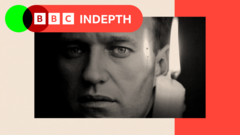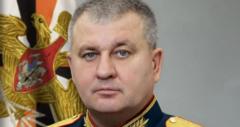Following the death of Alexei Navalny, Russia's political landscape has drastically shifted. Supporters of the late opposition figure grapple with silence and fear, while internal divisions and an increasingly authoritarian regime pose challenges to any unified resistance against Vladimir Putin's government.
The Future of Opposition in Russia: Echoes of Navalny After His Demise

The Future of Opposition in Russia: Echoes of Navalny After His Demise
A year since Alexei Navalny's death, Russian democratic opposition faces unprecedented repression and fragmentation, as loyal supporters navigate treacherous political waters.
One year after Alexei Navalny's suspicious death while imprisoned, the plight of opposition in Russia raises critical questions. Navalny's widow, Yulia Navalnaya, recently shared the plans for a headstone in Moscow that she hopes will become a "place of hope and strength" for those who oppose President Vladimir Putin. Living abroad under the threat of arrest, Navalnaya encapsulates the diminished ambitions of Russian dissidents.
Navalny had been a formidable figure in Russian politics, known for his tenacity in confronting Putin. Now, his supporters face dire consequences—their ranks have dwindled, with many either imprisoned or forced to flee Russia. As Putin appears more entrenched in power, the hope for a viable democratic opposition fades.
Ksenia Fadeeva, who was imprisoned due to her association with Navalny, recalls the moment she learned of his death. She, along with many others, has felt the tightening grip of Putin's regime over the last two decades, marked by severe crackdowns on dissent and media freedoms. The assassination of Boris Nemtsov ten years ago serves as a grim milestone in this ongoing repression.
In the wake of Navalny's death, the situation for Russia's opposition has not improved. Figures like Vladimir Kara-Murza—now serving a 25-year sentence—exemplify the risks faced by those who dare to voice dissent. Many former supporters remain silent or stay hidden, stifling the possibility of a united front.
Despite this chilling repression, Navalny’s allies strive to maintain pressure on the Kremlin from abroad, seeking to inform Russians through social media and films exposing government corruption. However, tight security measures stifle direct political action within Russia, where any opposition is criminalized.
Not all have lost hope, as some activists continue to work toward a vision of a democratic Russia. Yet analysts like Tatiana Stanovaya express concern over the erosion of support for dissident leaders. Many Russians, faced with threats and propaganda, appear to gravitate towards Putin for perceived stability amid a tumultuous geopolitical landscape.
Internal divisions among opposition groups further complicate their capacity to mount a unified challenge to the regime. Rivalries among activists have intensified, shifting focus away from common goals toward infighting, weakening the effectiveness of their movements.
Amid this bleak reality, some activists emphasize the need to help Ukraine, reflecting the interconnectedness of their struggles. As representatives of the opposition engage in external endeavors, the prospect for change inside Russia looks dimmer than ever.
Looking ahead, the likelihood of a transition from authoritarianism to democracy seems increasingly uncertain. The regime's brutal mechanisms of control and deep-rooted nationalist sentiments complicate the scenario for any potential uprising against the Kremlin.
As anniversaries of Navalny's death are marked globally, the resonance of his legacy continues to inspire, but the future of opposition in Russia remains precariously balanced between resilience and repression. In the shadow of an increasingly authoritarian state, the desire for a democratic Russia endures, though its realization appears daunting.




















